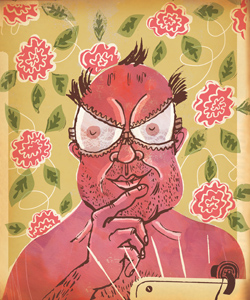I am writing at a time when “sex addiction” is much in the news. With any luck, it won’t be when you read this, although sex addiction is unlikely to vanish from headlines as long as there are people with lots of money, free time, hubris, and divorce attorneys. Caught cheating? Check into a clinic.
What bothers me about this is a recent proliferation of addictions—an addictions arms race with shopping and video games among the other newcomers. Why not just treat people in trouble without creating a new category for behaviors that may stem from very different roots? This rising tide of addictions, moreover, occurred when there was a perfectly good, traditional vocabulary for describing the same behavior, much of it not printable here. Admittedly, those words don’t have addiction’s implication of medical authority, special clinics, and billable hours. Sex addiction hasn’t yet entered the Diagnostic and Statistical Manual of Mental Disorders (DSM) but may be on the fast track to the popular culture equivalent of disorder canonization.
Good academic that I am, I decided to check out sex addiction—not by field work but by engaging in safe research on the Internet, in the privacy of my own, newly password-protected home network. It was revealing.
Sex addiction merits two national organizations. In common with similar organizations for other addictions, each follows the 12-step and 12-tradition program of the granddaddy of them all, Alcoholics Anonymous, almost word for word. These words, however, sound different when substituting sex for alcohol. Sex addicts might think twice before asking God “to remove our shortcomings.” And if a requirement is always to “maintain personal anonymity at the level of press, radio, films, and TV,” some sex addicts fail miserably.
I am also not sure all the language of other addictions transfers to sex addiction. Try to convince a long-suffering mate that you need a “maintenance dose.” Similarly, some of the paraphernalia might not work for sex addiction. I found, for example, a line of greeting cards that make sense when sent by the target audience, recovering alcoholics. From a recovering sex addict, however, they’re creepy. How would you feel receiving from such a person whimsical cards bearing messages such as “Let’s Get Together SOON!” and “Just for TODAY”?
For greater depth of research, I also checked out Gamblers Anonymous for another possible model for understanding and treating sex addiction. I will substitute “sex” for gambling and you can judge. Quotation #1: “After abstaining a few months some of our members have tried some small sex experimentation, always with disastrous results.” Quotation #2: “The intervals between sexual binges were not periods of constructive thinking. Symptomatic of these periods were nervousness, irritability, frustration, indecision, and a continued breakdown in personal relations.” Quotation #3: “The newcomer to abstinence will soon find a keen appreciation of the many pleasant and stimulating activities available—far removed from anything that is remotely associated with sex.” I am not sure there is a one-size-fits-all model for addictions, although Quotation #2 might indicate otherwise.
As for the actual treatment for sexual addiction, I found little specific information. One center offers “Equine Therapy,” among other options. And I appreciated the candor of a therapist who said, “We may not stop the behavior, but we’re going to ruin it for you.” Some of us had mothers and religious instructors who were ahead of the therapeutic curve.
Sex addiction may eventually enter the DSM, but it won’t truly have won the war for public acceptance until a betrayed spouse, golf club in hand, yells at the betrayer, “You sex addict!” At such moments, the language is likely to remain plainer and less therapeutic for a long time to come.
Guido Veloce is a Johns Hopkins University professor.

